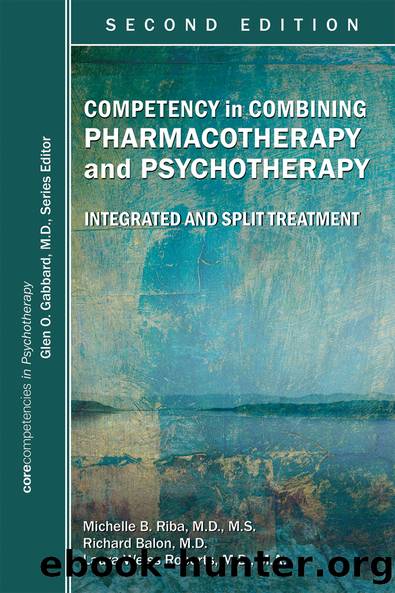Competency in Combining Pharmacotherapy and Psychotherapy by Michelle B. Riba Richard Balon Laura Weiss Roberts

Author:Michelle B. Riba,Richard Balon,Laura Weiss Roberts [Неизв.]
Language: eng
Format: epub
ISBN: 9781615371808
Publisher: American Psychiatric Association
Published: 2018-09-27T20:00:00+00:00
Evaluation and Opening in Split/Collaborative Treatment
6
In this chapter, we review the initial evaluation and opening of the treatment process of pharmacotherapy by a resident either 1) with a new patient who was referred by a nonmedical therapist or primary care physician for pharmacotherapy while the patient remains in therapy with the nonmedical therapist, or 2) with a new patient whom the resident evaluates and then decides that psychotherapy will be provided by another clinician for various reasons (e.g., time constraints; economic reasons [e.g., the third-party payer does not reimburse for psychotherapy provided by a psychiatrist]; lack of expertise in a specific area or with a specific population; geographic considerations). We address the initial evaluation and related competencies in each of these situations. There are of course many other combinations and permutations, but we believe these to be two of the major types of situations that should be understood by residents.
This chapter is similar to Chapter 3, âEvaluation and Opening in Integrated Treatment,â because the initial evaluations in integrated treatment and split/collaborative treatment bear many similarities. There are, however, issues specific to split/collaborative treatment that are important to point out and address. There has been some work done on the communication patterns between clinicians who are engaged in split/collaborative therapy. In one study by Kalman et al. (2012), split/collaborative therapy was common, but adequate communication between professionals did not take place. Hansen-Grant and Riba (1995), in a chart review study, found similar communication problems.
Our view is that all care should be collaborative and respectful and that if the psychiatrist or other physician is not collaborating or communicating with the nonmedical therapist, this is not optimal split/collaborative treatment.
Download
This site does not store any files on its server. We only index and link to content provided by other sites. Please contact the content providers to delete copyright contents if any and email us, we'll remove relevant links or contents immediately.
Periodization Training for Sports by Tudor Bompa(8237)
Why We Sleep: Unlocking the Power of Sleep and Dreams by Matthew Walker(6684)
Paper Towns by Green John(5164)
The Immortal Life of Henrietta Lacks by Rebecca Skloot(4566)
The Sports Rules Book by Human Kinetics(4367)
Dynamic Alignment Through Imagery by Eric Franklin(4200)
ACSM's Complete Guide to Fitness & Health by ACSM(4040)
Kaplan MCAT Organic Chemistry Review: Created for MCAT 2015 (Kaplan Test Prep) by Kaplan(3993)
Livewired by David Eagleman(3754)
Introduction to Kinesiology by Shirl J. Hoffman(3753)
The Death of the Heart by Elizabeth Bowen(3596)
The River of Consciousness by Oliver Sacks(3589)
Alchemy and Alchemists by C. J. S. Thompson(3504)
Bad Pharma by Ben Goldacre(3413)
Descartes' Error by Antonio Damasio(3262)
The Emperor of All Maladies: A Biography of Cancer by Siddhartha Mukherjee(3133)
The Gene: An Intimate History by Siddhartha Mukherjee(3085)
The Fate of Rome: Climate, Disease, and the End of an Empire (The Princeton History of the Ancient World) by Kyle Harper(3046)
Kaplan MCAT Behavioral Sciences Review: Created for MCAT 2015 (Kaplan Test Prep) by Kaplan(2972)
